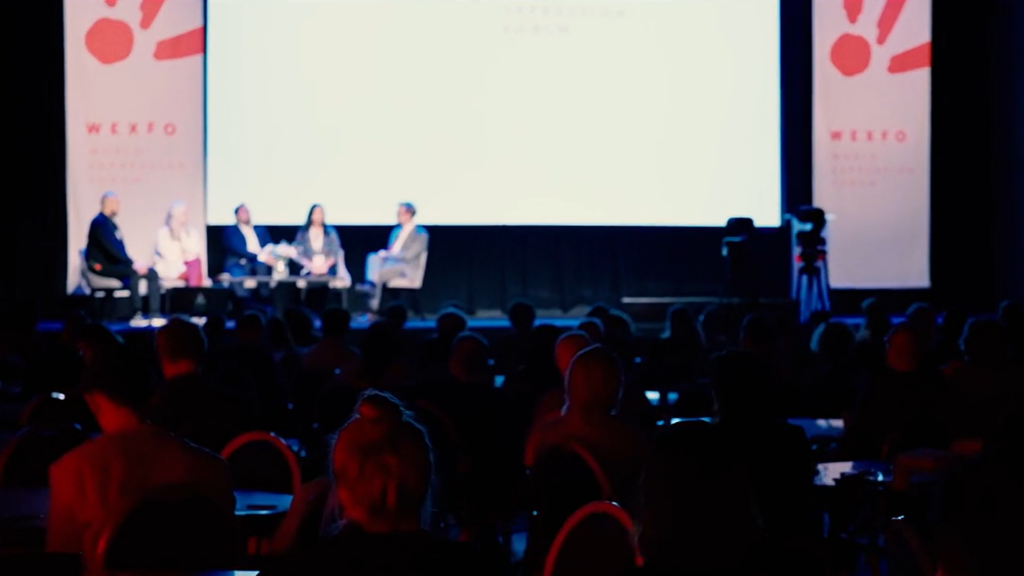
Troubling signs are emerging: Democracies are backsliding, conflicts are intensifying hate speech and misinformation, and artificial intelligence (AI) presents both opportunities and threats to free speech.
Freedom of expression: A pillar of democracy
Global freedom of expression is facing significant challenges, as highlighted at the World Expression Forum (WEXFO) 2024. Irene Khan, the UN Special Rapporteur on freedom of expression and opinion, delivered a keynote speech that underscored the critical importance of this fundamental right. Khan emphasized that freedom of expression is not just a right but a powerful tool that must be claimed, protected, and used to advocate for those who are silenced.
Challenges and action steps
The session highlighted several pressing challenges:
- Social media and disinformation: Platforms need to do more to fight the spread of disinformation and hate speech.
- Climate change misinformation: “Climate lies” is a growing concern.
- Digital inequalities: With 2.7 billion people still offline, digital access remains a significant issue.
To address these challenges, Khan proposed several action steps:
- Support media freedom: Demand transparency of media ownership.
- Strengthen local media: Counteract “media deserts” by supporting community and local media.
- Campaign against criminal libel: Advocate for journalist safety and investigate crimes against them.
- Resist book bans: Protect academic freedom by opposing book bans.
- Address digital inequalities: Promote digital access for all.
- Promote solidarity: Foster unity across genders, regions, and religions.
- Combat misinformation: Rely on accurate sources to fight falsehoods.
The global free speech recession
A panel featuring Irene Khan, Kjartan Sverdrup (TikTok Norway & Sweden), Lubna Jaffery (Norwegian Minister of Culture and Equality), and Khaled Emam (Justice Call) delved into the complexities of freedom of expression.
Key Insights
- War and Conflict: These pose significant threats to freedom of expression globally, with democracies like India and Israel experiencing backsliding.
- Educating Youth: Freedom of expression is essential even in countries like Norway. Teaching tolerance and accommodating diverse opinions are crucial.
- Complexity of freedom of expression: It involves not only the right to speak but also ensuring access to accurate information. Tolerance is vital, especially in the context of global conflicts.
- Social media’s role: Social media platforms play a major role in information dissemination. Content moderation is challenging but necessary to combat hate speech and misinformation.
- Balancing regulation: Legislation, rather than outright bans, is needed to address misinformation. Content moderation should be a shared responsibility guided by UN guidelines.
- Business models and regulations: Current social media business models often lead users down rabbit holes. Smart regulations are needed to address this issue.
- Conspiracy theories: Banning them isn’t practical. Editorial media can serve as an antidote, and social media platforms need to include editorial content to educate users.
Hope and solidarity
The discussions at WEXFO 2024 highlighted the urgent need to protect and promote freedom of expression in the face of numerous challenges. By supporting media freedom, combating misinformation, and fostering global solidarity, it is still possible to work towards a future where freedom of expression is upheld for all.
The session concluded on a hopeful note, emphasizing that connecting and paying attention to global issues can bring hope. Freedom requires effort and solidarity across borders.
This article is based on detailed notes from the session provided by Turid Wullf Knutsen, Senior EU Adviser at Innlandet fylkeskommune, and has been compiled by the WEXFO administration in collaboration with Microsoft Copilot.

